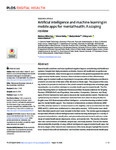Artificial intelligence and machine learning in mobile apps for mental health: A scoping review
| dc.contributor.author | Milne-Ives, Madison | |
| dc.contributor.author | Selby, E | |
| dc.contributor.author | Inkster, B | |
| dc.contributor.author | Lam, C | |
| dc.contributor.author | Meinert, Edward | |
| dc.date.accessioned | 2022-10-31T16:06:06Z | |
| dc.date.available | 2022-10-31T16:06:06Z | |
| dc.date.issued | 2022-08-15 | |
| dc.identifier.issn | 2767-3170 | |
| dc.identifier.issn | 2767-3170 | |
| dc.identifier.other | e0000079 | |
| dc.identifier.uri | http://hdl.handle.net/10026.1/19803 | |
| dc.description.abstract |
<jats:p>Mental health conditions can have significant negative impacts on wellbeing and healthcare systems. Despite their high prevalence worldwide, there is still insufficient recognition and accessible treatments. Many mobile apps are available to the general population that aim to support mental health needs; however, there is limited evidence of their effectiveness. Mobile apps for mental health are beginning to incorporate artificial intelligence and there is a need for an overview of the state of the literature on these apps. The purpose of this scoping review is to provide an overview of the current research landscape and knowledge gaps regarding the use of artificial intelligence in mobile health apps for mental health. The Preferred Reporting Items for Systematic Reviews and Meta-Analyses extension for Scoping Reviews (PRISMA-ScR) and Population, Intervention, Comparator, Outcome, and Study types (PICOS) frameworks were used to structure the review and the search. PubMed was systematically searched for randomised controlled trials and cohort studies published in English since 2014 that evaluate artificial intelligence- or machine learning-enabled mobile apps for mental health support. Two reviewers collaboratively screened references (MMI and EM), selected studies for inclusion based on the eligibility criteria and extracted the data (MMI and CL), which were synthesised in a descriptive analysis. 1,022 studies were identified in the initial search and 4 were included in the final review. The mobile apps investigated incorporated different artificial intelligence and machine learning techniques for a variety of purposes (risk prediction, classification, and personalisation) and aimed to address a wide range of mental health needs (depression, stress, and suicide risk). The studies’ characteristics also varied in terms of methods, sample size, and study duration. Overall, the studies demonstrated the feasibility of using artificial intelligence to support mental health apps, but the early stages of the research and weaknesses in the study designs highlight the need for more research into artificial intelligence- and machine learning-enabled mental health apps and stronger evidence of their effectiveness. This research is essential and urgent, considering the easy availability of these apps to a large population.</jats:p> | |
| dc.format.extent | e0000079-e0000079 | |
| dc.format.medium | Electronic-eCollection | |
| dc.language | en | |
| dc.language.iso | en | |
| dc.publisher | Public Library of Science | |
| dc.subject | Depression | |
| dc.subject | Mental Health | |
| dc.subject | Behavioral and Social Science | |
| dc.subject | Generic health relevance | |
| dc.subject | Mental health | |
| dc.title | Artificial intelligence and machine learning in mobile apps for mental health: A scoping review | |
| dc.type | journal-article | |
| dc.type | Journal Article | |
| plymouth.author-url | https://www.ncbi.nlm.nih.gov/pubmed/36812623 | |
| plymouth.issue | 8 | |
| plymouth.volume | 1 | |
| plymouth.publication-status | Published online | |
| plymouth.journal | PLOS Digital Health | |
| dc.identifier.doi | 10.1371/journal.pdig.0000079 | |
| plymouth.organisational-group | /Plymouth | |
| plymouth.organisational-group | /Plymouth/Faculty of Health | |
| plymouth.organisational-group | /Plymouth/Faculty of Health/School of Nursing and Midwifery | |
| plymouth.organisational-group | /Plymouth/REF 2021 Researchers by UoA | |
| plymouth.organisational-group | /Plymouth/REF 2021 Researchers by UoA/UoA03 Allied Health Professions, Dentistry, Nursing and Pharmacy | |
| plymouth.organisational-group | /Plymouth/Users by role | |
| plymouth.organisational-group | /Plymouth/Users by role/Academics | |
| plymouth.organisational-group | /Plymouth/Users by role/Researchers in ResearchFish submission | |
| dc.publisher.place | United States | |
| dcterms.dateAccepted | 2022-06-22 | |
| dc.rights.embargodate | 2022-11-1 | |
| dc.identifier.eissn | 2767-3170 | |
| dc.rights.embargoperiod | Not known | |
| rioxxterms.versionofrecord | 10.1371/journal.pdig.0000079 | |
| rioxxterms.licenseref.uri | http://www.rioxx.net/licenses/all-rights-reserved | |
| rioxxterms.type | Journal Article/Review |


